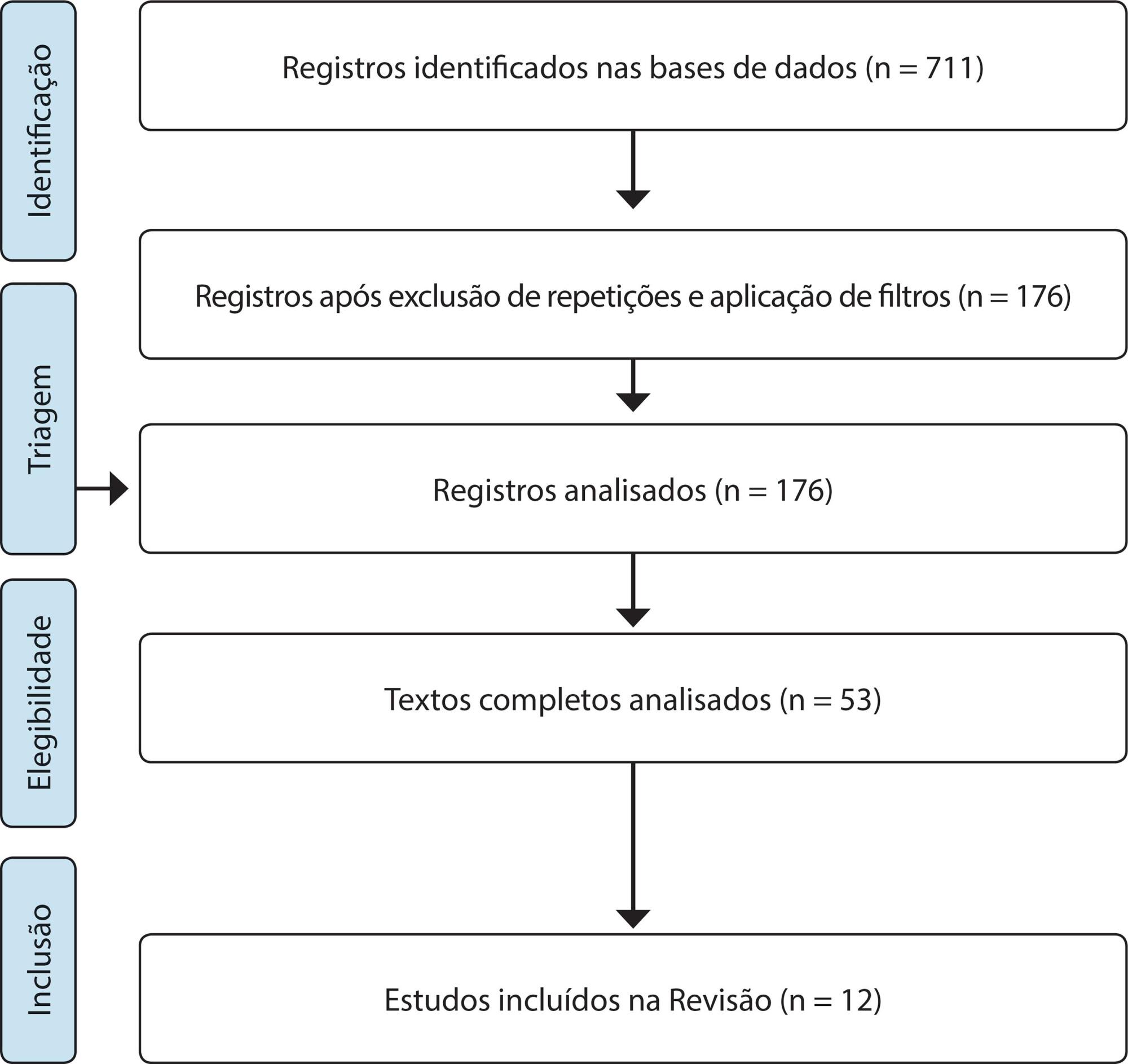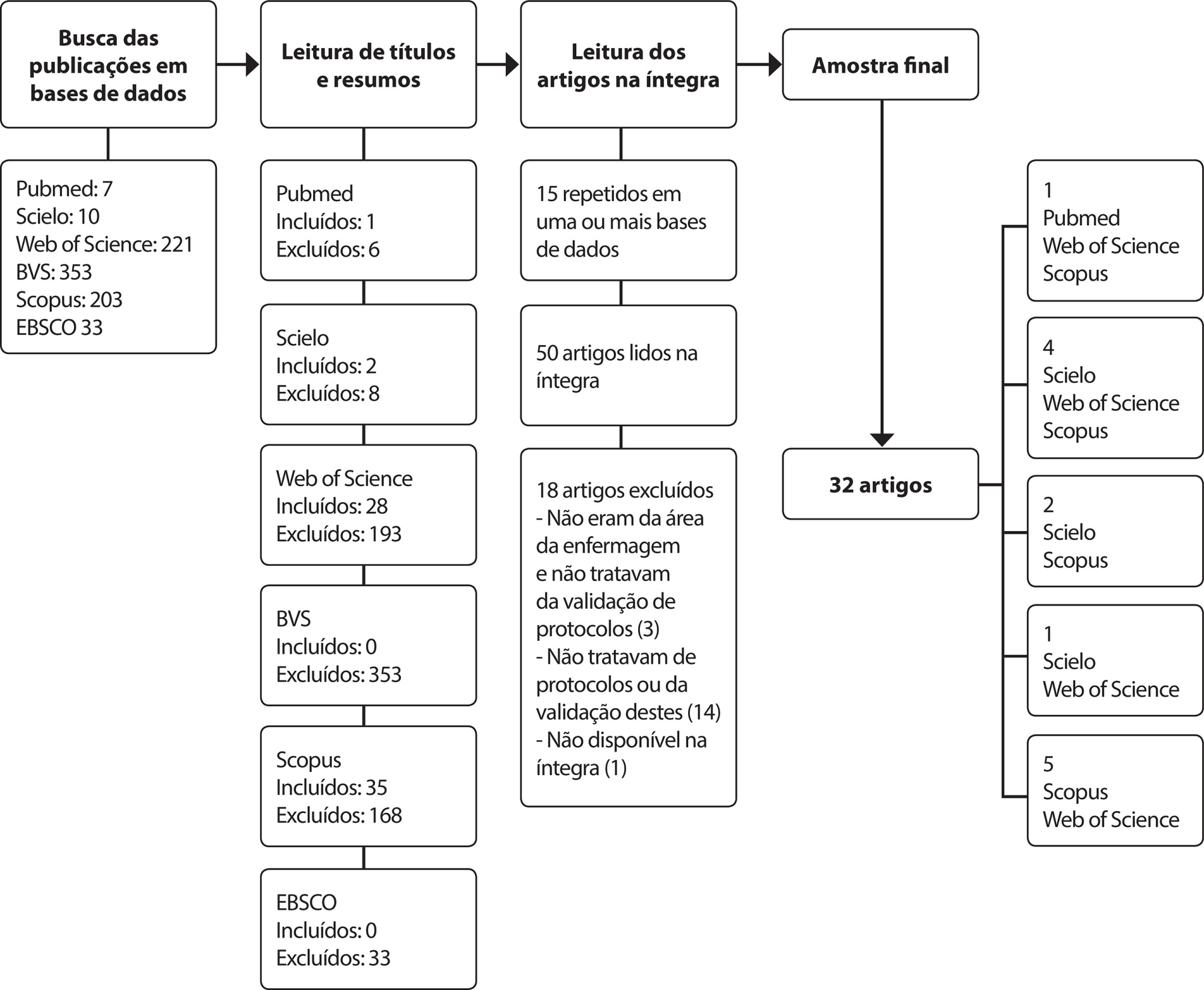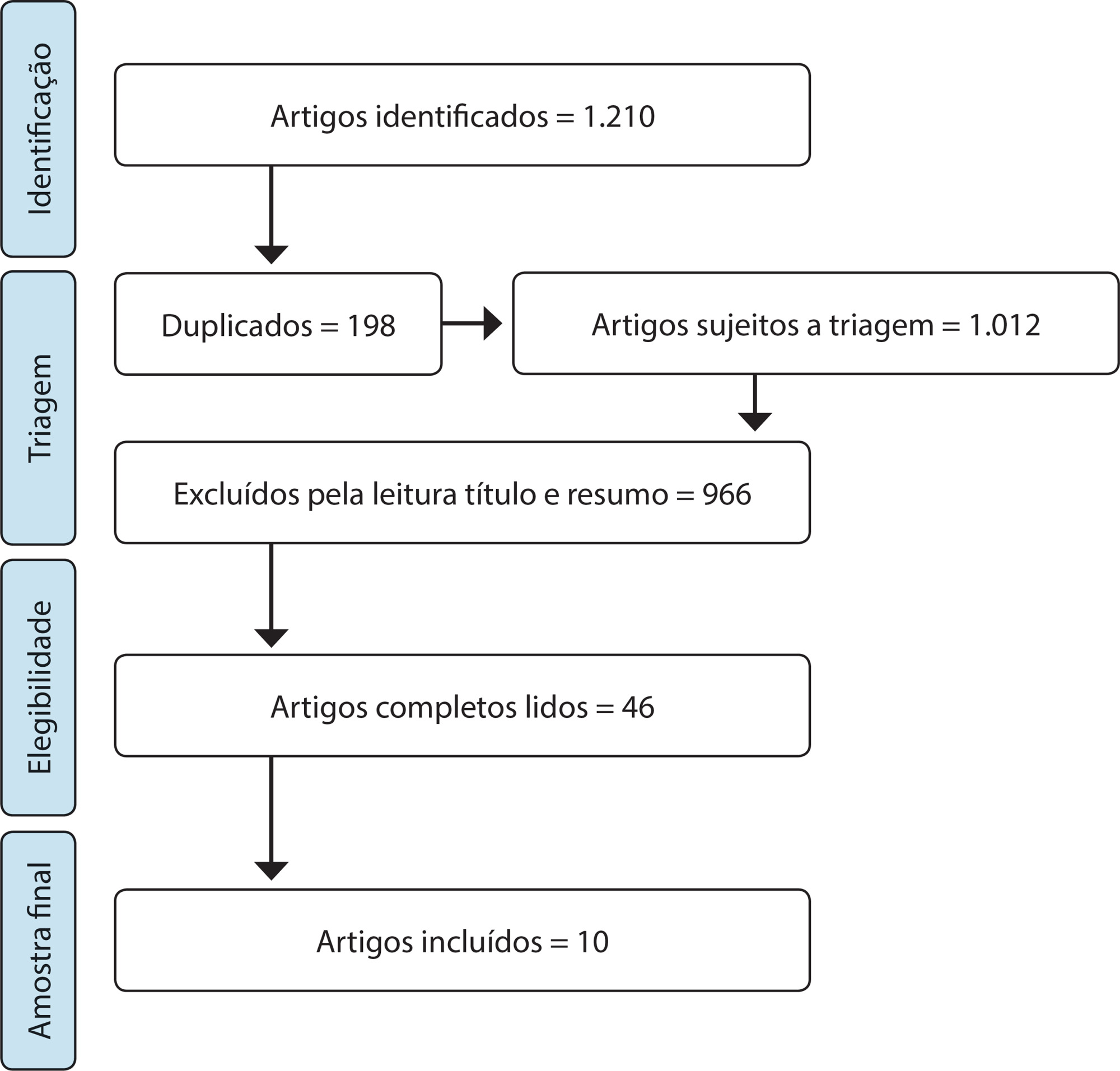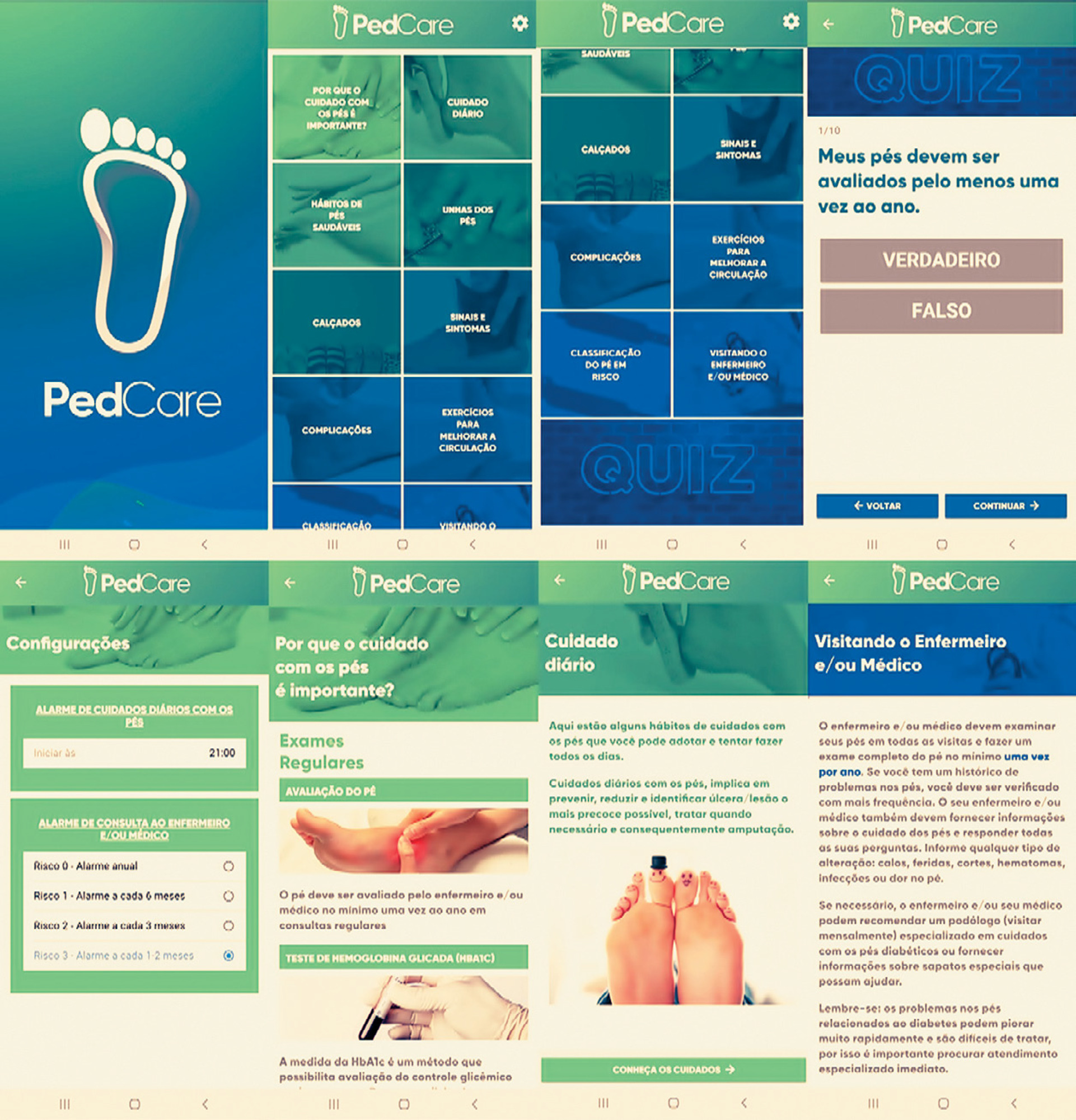-
ORIGINAL ARTICLE
Training profile of intensive care nurses in Brazil: cross-sectional study
Revista Brasileira de Enfermagem. 2024;77(6):e20230460
16/12/2024
Resumo
ORIGINAL ARTICLETraining profile of intensive care nurses in Brazil: cross-sectional study
Revista Brasileira de Enfermagem. 2024;77(6):e20230460
16/12/2024DOI 10.1590/0034-7167-2023-0460
Visualizações0ABSTRACT
Objectives:
to describe the training profile of Brazilian intensive care nurses.
Methods:
a cross-sectional study carried out in two stages: a structured, self-administered questionnaire; mapping of the national supply of lato sensu postgraduate courses. Data was collected on the sociodemographic profile, training process and characterization of the courses.
Results:
in the first stage, 202 respondents were obtained. The majority were women (79.2%), aged between 26 and 45 (80.7%), graduated less than 5 years ago (44%), through lato sensu postgraduate courses (55.5%), which were marked by the absence of laboratory practice (57.5%) and guided tours (42.5%). In the second stage, 457 courses were identified, with face-to-face teaching (58.9%), a workload of 360 to 420 hours (51.2%), a duration of up to 6 months (41.8%) and variation in the sub-area of training.
Conclusions:
there was a predominance of professionals graduating from lato sensu post-graduate courses, with essentially theoretical teaching and heterogeneity in terms of modality, workload and sub-area of training.
Palavras-chave: Critical Care NursingEducationIntensive Care UnitsNursing EducationNursing, GraduateProfessional PracticeVer mais -
ORIGINAL ARTICLE
Predisposing factors for symptoms of anxiety, depression, and insomnia in university students
Revista Brasileira de Enfermagem. 2024;77(6):e20230387
16/12/2024
Resumo
ORIGINAL ARTICLEPredisposing factors for symptoms of anxiety, depression, and insomnia in university students
Revista Brasileira de Enfermagem. 2024;77(6):e20230387
16/12/2024DOI 10.1590/0034-7167-2023-0387
Visualizações0Ver maisABSTRACT
Objectives:
to characterize the sociodemographic and psychological aspects of university students who sought psychiatric care at a Student Support Center of a Federal University and to analyze associations between mental health issues and predisposing factors.
Methods:
a retrospective analysis of 103 medical records was conducted. The statistical analysis consisted of two steps: a descriptive analysis and a predictive analysis using the Logistic Regression Model.
Results:
the majority of the students were female. Symptoms of anxiety, depression, and insomnia were the main reasons for seeking care. Students who reported having emotional difficulties that negatively impacted their studies and those who had undergone some form of health treatment showed a higher probability of experiencing anxiety symptoms. Notable correlations were found between anxiety and emotional difficulties, depression and diarrhea, and insomnia and a sedentary lifestyle.
Conclusions:
symptoms of anxiety, depression, and insomnia led students to seek psychiatric care at the university. Understanding the predisposing factors for mental health issues in university students can inform care strategies and promote academic success.
-
ORIGINAL ARTICLE
Complexities of nursing in healthcare waste management in hospitals
Revista Brasileira de Enfermagem. 2024;77(6):e20230391
16/12/2024
Resumo
ORIGINAL ARTICLEComplexities of nursing in healthcare waste management in hospitals
Revista Brasileira de Enfermagem. 2024;77(6):e20230391
16/12/2024DOI 10.1590/0034-7167-2023-0391
Visualizações0Ver maisABSTRACT
Objectives:
to understand how healthcare waste management is developed by nursing professionals in hospitals.
Methods:
qualitative research, whose theoretical and methodological frameworks were Complexity Theory and Grounded Theory. Thirty-two nursing professionals from a public hospital in Rio de Janeiro participated in the study. Semi-structured interviews were used.
Results:
nursing affects healthcare waste management multidimensionally. Shortage of materials and work overload were identified as factors that influence professionals’ decision-making and increase the risk of improper waste disposal. The lack of knowledge on the subject also influences nursing practice. However, professionals value actions related to hazardous waste.
Final Considerations:
nursing professionals recognize themselves in healthcare waste management and understand the need to develop systemic awareness for sustainable practice.
-
ORIGINAL ARTICLE
Educational technology to empower patients as participants in their care
Revista Brasileira de Enfermagem. 2024;77(6):e20230359
16/12/2024
Resumo
ORIGINAL ARTICLEEducational technology to empower patients as participants in their care
Revista Brasileira de Enfermagem. 2024;77(6):e20230359
16/12/2024DOI 10.1590/0034-7167-2023-0359
Visualizações0Ver maisABSTRACT
Objectives:
to build and validate an educational technology to empower patients as participants in their own care.
Methods:
methodological study to develop an educational technology based on the elaboration, validation, and evaluation that were carried out in five stages at a teaching hospital in Amazonas. The study was carried out from 2019 to 2022, with the participation of 19 judges specialized in patient safety and 72 patients admitted to the hospital’s medical and surgical clinics, the study setting.
Results:
the agreement between the judges obtained an overall index of 0.85, being considered validated. The overall analysis of the booklet obtained an assessment of the level of agreement above 85%.
Final Considerations:
the educational technology presented here was validated and suitable for promoting patient/professional rapprochement and consolidating health care in a way that increases the patient’s ability to contribute to their treatment and prevent the occurrence of adverse events.

-
ORIGINAL ARTICLE
Respectful care for postpartum women with sickle cell disease: a netnographic study
Revista Brasileira de Enfermagem. 2024;77(6):e20230545
16/12/2024
Resumo
ORIGINAL ARTICLERespectful care for postpartum women with sickle cell disease: a netnographic study
Revista Brasileira de Enfermagem. 2024;77(6):e20230545
16/12/2024DOI 10.1590/0034-7167-2023-0545
Visualizações0Ver maisABSTRACT
Objectives:
to analyze principles of respectful maternity care in narratives of postpartum women with sickle cell disease, relating them to Sustainable Development Goals.
Methods:
netnographic study, with two videos published in 2020. Deductive iconographic and thematic analysis by Respectful Maternity Care Charter, organized in MAXQDA.
Results:
principles identified were the right to: freedom from harm and ill-treatment; information, informed consent, refusal of medical procedures, and respect for their choices and preferences including companion; be considered a person from birth, with dignified and respectful treatment; health at the highest possible level; newborns being with their parents or guardians. The Sustainable Development Goals for women by 2030 were not positively contemplated in postpartum women’s experience.
Final Considerations:
it is appropriate that health workers qualify themselves to provide respectful maternity care, with qualified listening, understanding, and resolution of unique demands of postpartum women with sickle cell disease, seeking equality in care for women.

-
Strategies for expanding vaccination coverage in children in Brazil: systematic literature review
Revista Brasileira de Enfermagem. 2024;77(6):e20230343
16/12/2024
Resumo
Strategies for expanding vaccination coverage in children in Brazil: systematic literature review
Revista Brasileira de Enfermagem. 2024;77(6):e20230343
16/12/2024DOI 10.1590/0034-7167-2023-0343
Visualizações0Ver maisABSTRACT
Objectives:
to identify the strategies found in the literature for increasing vaccination coverage among children in Brazil. It is justified mainly by the current scenario of falling vaccination coverage.
Methods:
systematic literature review. The search was carried out in the Pubmed (MEDLINE), Embase and Scopus databases, following the PRISMA guidelines.
Results:
initially, 4,824 results were returned. In the end, 6 studies were included for narrative synthesis using the SWiM methodology. Of these, 50% dealt with studies related to the Bolsa Família Program (PBF). The others explored strategies for approaching parents directly, Rapid Vaccination Monitoring (MRV) and the Community Health Agents Program (PACS). The PBF did not guarantee compliance with the conditionality of keeping vaccinations up to date. The MRV and PACS are effective strategies, especially because they allow active search for absentees.
Conclusions:
we conclude that more publications are needed on strategies to increase vaccination coverage among children in Brazil.

-
ORIGINAL ARTICLE
Construction and validation of an educational game on biosafety in the central sterile supply department
Revista Brasileira de Enfermagem. 2024;77(6):e20230478
16/12/2024
Resumo
ORIGINAL ARTICLEConstruction and validation of an educational game on biosafety in the central sterile supply department
Revista Brasileira de Enfermagem. 2024;77(6):e20230478
16/12/2024DOI 10.1590/0034-7167-2023-0478
Visualizações0Ver maisABSTRACT
Objectives:
to construct and validate an educational game on biosafety in the Central Sterile Supply Department of a hospital in Curitiba, PR.
Methods:
the study was conducted using a quantitative approach, employing applied and technological research with an exploratory design. The process was divided into six stages, from the definition of the theme to the validation and application of the game. The study was carried out from May to August 2022, involving 17 nursing professionals from a Central Sterile Supply Department during day and night shifts, as well as 9 judges.
Results:
the study resulted in the construction of a board game named by the authors as “My Health First.”
Conclusions:
the research achieved its objective of constructing and validating an educational game. By reflecting on professional practice and correlating the occupational risks present, the professionals were able to list safe actions, identify problems, and seek solutions.

-
ORIGINAL ARTICLE
Validação de cenário de simulação clínica no manejo da hemorragia pós-parto
Revista Brasileira de Enfermagem. 2019;72(3):624-631
27/06/2019
Resumo
ORIGINAL ARTICLEValidação de cenário de simulação clínica no manejo da hemorragia pós-parto
Revista Brasileira de Enfermagem. 2019;72(3):624-631
27/06/2019DOI 10.1590/0034-7167-2018-0065
Visualizações0RESUMO
Objetivo:
Construir e validar um cenário de simulação clínica para a hemorragia pós-parto.
Método:
Pesquisa quantitativa, de desenvolvimento metodológico, realizada de maio a julho de 2016 com 22 juízes especialistas e 30 discentes. A análise foi realizada a partir da estatística descritiva, Teste Binomial e Índice de Validade de Conteúdo (CVI), considerando o CVI ≥ 80%.
Resultados:
A construção do cenário foi baseada nos objetivos de aprendizagem, fidelidade, instrumento de avaliação, atividades desenvolvidas antes do cenário e debriefing. A concordância, quanto à sua validade, foi satisfatória nos 23 itens analisados. Os itens avaliados pelos juízes tiveram CVI > 0,90; na avaliação pelos discentes, o CVI > 0,95.
Conclusão:
Considerou-se validado e adequado para capacitação e utilização pelos discentes de enfermagem. Outros estudos deverão ser realizados, a fim de testar sua eficácia na construção do conhecimento teórico e prático tanto de discentes de enfermagem quanto por enfermeiros durante a Educação Permanente.
Palavras-chave: Educação em EnfermagemEnfermagemEstudos de ValidaçãoObstetríciaTreinamento por SimulaçãoVer mais -
REVISÃO
Acesso da população negra a serviços de saúde: revisão integrativa
Revista Brasileira de Enfermagem. 2020;73(4):e20180834
01/06/2020
Resumo
REVISÃOAcesso da população negra a serviços de saúde: revisão integrativa
Revista Brasileira de Enfermagem. 2020;73(4):e20180834
01/06/2020DOI 10.1590/0034-7167-2018-0834
Visualizações0RESUMO
Objetivos:
evidenciar e discutir como ocorre o acesso da população negra aos serviços de saúde.
Métodos:
revisão integrativa da literatura com a seguinte pergunta: Como ocorre o acesso da população negra aos serviços de saúde? A busca foi realizada nas bases de dados Scholar, LILACS e SciELO e utilizou o descritor “acesso aos serviços de saúde” e o termo “população”, resultando em uma amostra de doze artigos.
Resultados:
estudos demonstram que a dificuldade de acesso é um fator fundamental para a qualidade de vida das pessoas, comprometendo diretamente serviços preventivos, principalmente para a saúde da mulher e, ainda, é impactante para o processo de adoecimento da população negra dentro de suas particularidades.
Considerações Finais:
diversos fatores limitantes comprometem o acesso da população negra aos serviços de saúde, desde institucionais a estruturais.
Palavras-chave: Acesso aos Serviços de SaúdeAtenção Primária à SaúdeGrupo com Ancestrais do Continente AfricanoPolítica de SaúdeSaúde das Minorias ÉtnicasVer mais
-
REVISÃO
Métodos de validação de protocolos assistenciais de enfermagem: revisão integrativa
Revista Brasileira de Enfermagem. 2020;73:e20200050
19/10/2020
Resumo
REVISÃOMétodos de validação de protocolos assistenciais de enfermagem: revisão integrativa
Revista Brasileira de Enfermagem. 2020;73:e20200050
19/10/2020DOI 10.1590/0034-7167-2020-0050
Visualizações0Ver maisRESUMO
Objetivo:
identificar a produção científica acerca dos métodos de validação de protocolos assistenciais de enfermagem.
Método:
revisão integrativa, com busca nas bases de dados Scielo, PubMed/MEDLINE, Biblioteca Virtual em Saúde, Web of Science, Scopus e EBSCOhost, utilizando os descritores validation studies, validation studies as topic, protocols, clinical protocols, practice guidelines as topic, nursing e nursing assessment e o descritor não controlado validation.
Resultados:
foram selecionados 32 artigos, sendo a maioria brasileiros. A validação de conteúdo por especialistas foi o método mais frequente, sem consenso sobre o número de participantes para o processo. Os instrumentos de coleta foram majoritariamente elaborados pelos autores. A análise dos dados foi realizada por estatística descritiva e Índice de Validade de Conteúdo, com taxa de concordância variável nos artigos analisados.
Conclusão:
protocolos validados por especialistas constituem ferramentas robustas para o uso na prática clínica, sendo o rigor metodológico no desenvolvimento imprescindível para a qualidade do mesmo.

-
ORIGINAL ARTICLE
Occupational stress and engagement in primary health care workers
Revista Brasileira de Enfermagem. 2019;72(6):1580-1587
21/10/2019
Resumo
ORIGINAL ARTICLEOccupational stress and engagement in primary health care workers
Revista Brasileira de Enfermagem. 2019;72(6):1580-1587
21/10/2019DOI 10.1590/0034-7167-2018-0681
Visualizações0ABSTRACT
Objective:
To evaluate levels of occupational stress and work engagement among primary health care workers.
Method:
A descriptive, correlational and transversal study was carried out in a small municipality in the countryside of São Paulo, with a non-probabilistic sample of convenience, with 85 workers. Three self-applied instruments were used: one developed by researchers, containing sociodemographic variables; Work Stress Scale (WSS) and Utrech Work Engagement Scale (UWES).
Results:
Prevalence of women (72.6%), 40 years old or more (45.9%), 4 years and 4 months of mean working time in primary care. Thirty-one workers (36.5%) presented significant stress (scores ≥2.5). Work engagement showed a mean of 4.1 (±1.2) to 4.4 (±1.4), classified as high in all dimensions. Occupational stress and work engagement correlated negatively.
Conclusion:
Workers presented high levels of work engagement; more than one-third had significant occupational stress. Workers with high levels of occupational stress tend to have lower work engagement.
Palavras-chave: Family Health StrategyHealth PersonnelOccupational StressPrimary Health CareWork EngagementVer mais -
ORIGINAL ARTICLE
Patient safety culture: perception of nursing professionals in high complexity institutions
Revista Brasileira de Enfermagem. 2020;73(5):e20190174
01/07/2020
Resumo
ORIGINAL ARTICLEPatient safety culture: perception of nursing professionals in high complexity institutions
Revista Brasileira de Enfermagem. 2020;73(5):e20190174
01/07/2020DOI 10.1590/0034-7167-2019-0174
Visualizações0Ver maisABSTRACT
Objectives:
to analyze the perception of nursing professionals about patient safety culture in three highly complex hospital institutions.
Methods:
descriptive and quantitative study with professionals working in care. The Hospital Survey on Patient Safety Culture questionnaire was applied, classifying its dimensions according to the percentage of positive responses (strengthened: ≥75.0%; potential for improvement: <75.0% to> 50.0%; weakened: ≤50.0%).
Results:
four hundred sixty-seven professionals (79.6%), mostly women (88.4%), nursing technicians/assistants (57.2%), 20 to 39 years (60.8%), less than five years in the institution (57.8%) and exclusive bond (79.2%) participated in the study. Safety culture was considered fragile, seven dimensions assessed as such, highlighting “Openness to communication” and “Non-punitive responses to errors” with <30.0% positive responses.
Conclusions:
evidence of the need for discussion of the subject and strategies for change that promote quality and safety of care.

-
REVISÃO
Cuidado transicional aos cuidadores de idosos dependentes: revisão integrativa da literatura
Revista Brasileira de Enfermagem. 2020;73:e20200394
06/11/2020
Resumo
REVISÃOCuidado transicional aos cuidadores de idosos dependentes: revisão integrativa da literatura
Revista Brasileira de Enfermagem. 2020;73:e20200394
06/11/2020DOI 10.1590/0034-7167-2020-0394
Visualizações0Ver maisRESUMO
Objetivo:
Identificar as necessidades dos cuidadores de idosos dependentes para o autocuidado na transição do hospital para casa.
Métodos:
Revisão integrativa que seguiu um protocolo pré-definido, realizada de março a maio de 2019, nas plataformas EBSCO, B-On, Scopus, Web of Science e Joanna Briggs Institute. Foram definidos descritores e critérios de elegibilidade para a amostra bibliográfica, que ficou constituída por dez artigos. Pela atualidade da evidência, limitou-se a pesquisa aos anos de 2015 a 2019.
Resultados:
As necessidades de cuidados transicionais para os cuidadores agrupam-se em cinco categorias: necessidades na transição para o papel de cuidador, necessidades de autocuidado dele próprio, necessidades de saúde, necessidades econômicas e necessidades sociais e comunitárias.
Considerações finais:
O cuidado transicional para os cuidadores deve ter dois focos de atenção, por parte dos enfermeiros: a gestão dos cuidados ao familiar dependente e a gestão das necessidades e dos cuidados ao próprio cuidador.

-
ORIGINAL ARTICLE
Avaliação do debriefing na simulação clínica em enfermagem: um estudo transversal
Revista Brasileira de Enfermagem. 2019;72(3):788-794
27/06/2019
Resumo
ORIGINAL ARTICLEAvaliação do debriefing na simulação clínica em enfermagem: um estudo transversal
Revista Brasileira de Enfermagem. 2019;72(3):788-794
27/06/2019DOI 10.1590/0034-7167-2018-0103
Visualizações0Ver maisRESUMO
Objetivo:
Avaliar a contribuição do debriefing após as simulações clínicas para estudantes de enfermagem.
Método:
Estudo quantitativo, realizado com 35 estudantes de enfermagem que participaram de cinco cenários de simulação clínica com debriefings planejados a partir do modelo da National League Nursing/Jeffries Simulation Theory. Após o quinto cenário, os estudantes responderam a Escala de Avaliação do Debriefing associado à Simulação.
Resultados:
Os itens avaliados envolveram os valores psicossocial, cognitivo e afetivo, sendo que dentro de uma escala de um a cinco, a maior média foi no valor cognitivo com 4,23 (±0,56) pontos, em seguida no psicossocial com 3,77 (±0,53) e por último no valor afetivo com 3,71 (±0,63) pontos.
Conclusão:
O debriefing conduzido após os cenários de simulação clínica foi um exercício reflexivo que contribuiu para o estudante integrar saberes múltiplos nos valores afetivo, cognitivo e psicossocial, e assim desenvolver as competências requeridas.
-
ORIGINAL ARTICLE
PEDCARE: validação de um aplicativo móvel sobre o autocuidado com o pé diabético
Revista Brasileira de Enfermagem. 2021;74:e20200856
24/05/2021
Resumo
ORIGINAL ARTICLEPEDCARE: validação de um aplicativo móvel sobre o autocuidado com o pé diabético
Revista Brasileira de Enfermagem. 2021;74:e20200856
24/05/2021DOI 10.1590/0034-7167-2020-0856
Visualizações0RESUMO
Objetivo:
descrever o processo de validação de aplicativo multimídia em plataforma móvel para a promoção de cuidado com os pés de pessoas com diabetes.
Método:
estudo de produção tecnológica, do tipo metodológico. O conteúdo e a aparência foram validados por 39 juízes (29 juízes na área de enfermagem e dez com experiência profissional em tecnologia da informação e comunicação e 15 pessoas do público-alvo).
Resultados:
os juízes na área de enfermagem possibilitaram a validação do material com Índice de Validade do Conteúdo total de 0,95, teste binomial não significativo para maioria dos itens e alfa de Cronbach de 0,92, juízes da área de tecnologia da informação e comunicação com Suitability Assessment of Materials de 99,2% e o público-alvo com Índice de Concordância de 98%.
Conclusão:
o aplicativo mostrou-se válido e confiável para uso na prática clínica como tecnologia educacional para promoção de cuidados com os pés de pessoas com diabetes.
Palavras-chave: Aplicativos MóveisDiabetes MellitusEducação em SaúdeEstudos de ValidaçãoPé DiabéticoVer mais
Búsqueda
Buscar en:
Nuvem de Tags
Adolescente (85) Atenção Primária à Saúde (239) COVID-19 (91) Criança (91) Cuidados de Enfermagem (269) Educação em Enfermagem (151) Educação em Saúde (139) Enfermagem (930) Enfermagem Pediátrica (86) Estudantes de Enfermagem (77) Estudos de Validação (131) Família (87) Idoso (208) Promoção da Saúde (99) Qualidade de Vida (104) Saúde do Trabalhador (86) Saúde Mental (145) Saúde Pública (82) Segurança do Paciente (150) Tecnologia Educacional (100)



